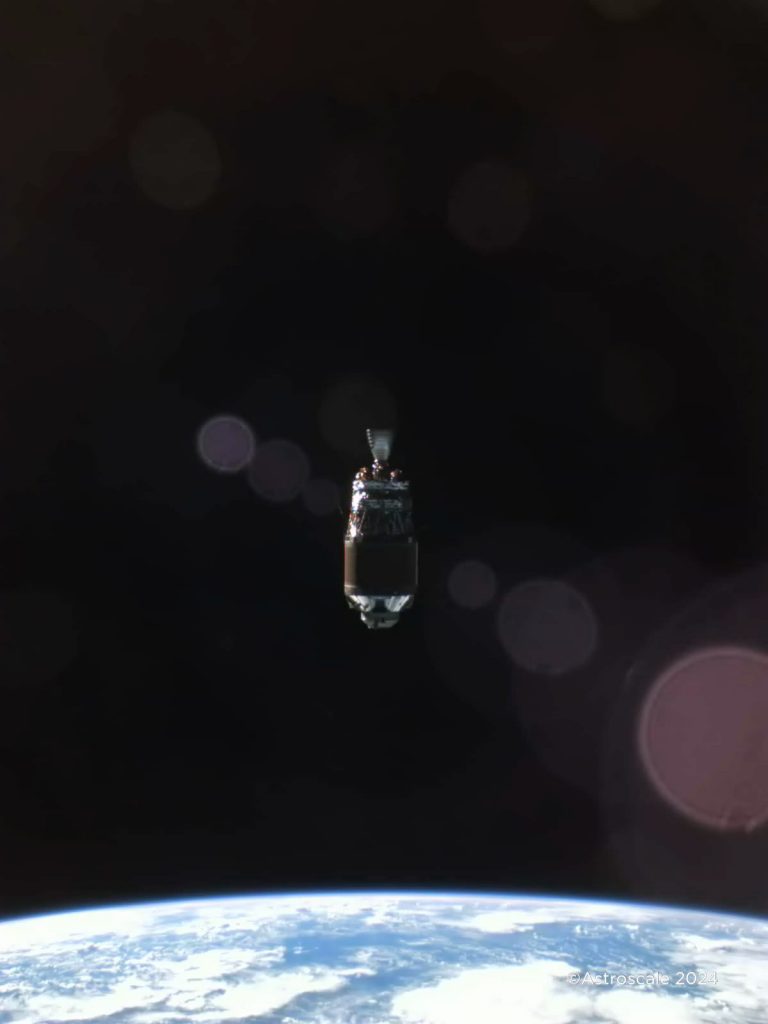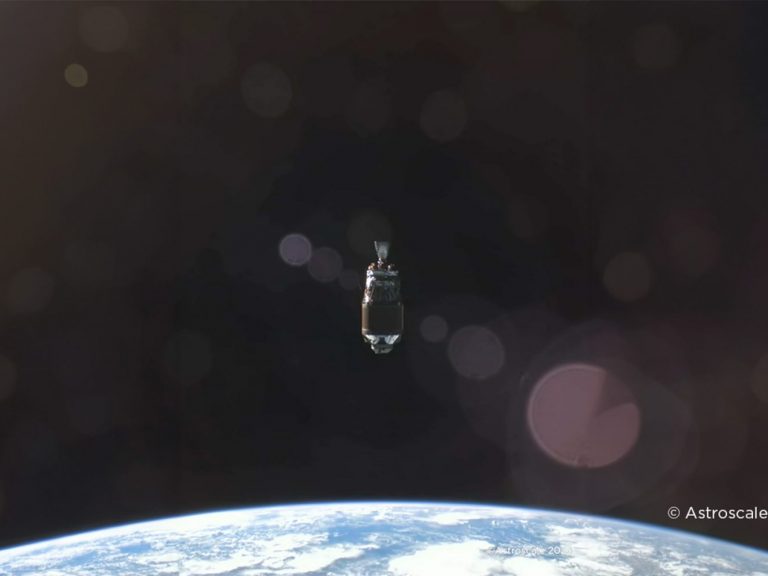Astroscale’s ADRAS-J Conducts First Fly-Around Observation of Space Debris
Groundbreaking maneuver provides new images of orbital debris and confirms effective onboard collision avoidance system.
Tokyo, Japan, Jul. 9, 2024 – Astroscale Japan Inc. (“Astroscale Japan”), a subsidiary of Astroscale Holdings Inc. (“Astroscale”), a market leader in satellite servicing and long-term orbital sustainability across all orbits, announced that its commercial debris inspection demonstration satellite, Active Debris Removal by Astroscale-Japan (ADRAS-J), has successfully taken further images of a debris object in space and demonstrated the effectiveness of its collision avoidance system while conducting a fly-around observation of the debris — a rocket upper stage.
ADRAS-J is the world’s first attempt to safely approach, characterize and survey the state of an existing piece of large debris through Rendezvous and Proximity Operations[1] (RPO). This groundbreaking mission is rendezvousing with an unprepared Japanese upper stage rocket body that is approximately 11 meters long, 4 meters in diameter, and weighs approximately 3 tons. After demonstrating safe approach and proximity operations with the object that is the size of a city bus, ADRAS-J has been gathering images and other data to assess its movement and structural condition. Unprepared objects in orbit are not designed with any technologies that enable docking or potential servicing or removal, heightening the complexity of the operations.
The fly-around observation involved a complex, autonomous operation to maneuver ADRAS-J around the upper stage client for continuous image-taking, providing more insights into its characteristics and movement. These operations utilized relative navigation data from the Light Detection and Ranging (LiDAR) sensor, along with custom-developed software algorithms for alignment and control. ADRAS-J maintained a fixed distance of approximately 50 meters during the fly-around operations to capture images of the client, facilitating assessment for potential future removal. When ADRAS-J was approximately one-third through the fly-around observation (~120 degrees), an autonomous abort was triggered by the onboard collision avoidance system due to an unexpected attitude anomaly, and ADRAS-J safely maneuvered away from the client as designed.
Proximity operations and safe approaches to client objects are critical for on-orbit services, and Astroscale prioritizes safety during all of its mission operations. ADRAS-J in particular is designed to avoid collisions at every phase of this challenging RPO mission, featuring:
- Fault-Detection, Isolation, and Recovery (FDIR) software that detects anomalies with the spacecraft or within the relative distance to the client and implements countermeasures.
- If the FDIR system detects an anomaly and the distance to the client is shorter than a certain threshold, an abort maneuver is performed to avoid collision.
- Multiple types of abort maneuvers are designed for the situation and trajectory, considering positional relationship and directions.
The abort maneuver implemented during the fly-around operation demonstrated that ADRAS-J can maintain safety even while performing close approach observations of non-cooperative objects. The autonomous abort maneuver performed as designed, validating extensive simulations that were conducted during the spacecraft’s development to verify safety and confirming the effectiveness of the collision avoidance system. There was no impact on ADRAS-J due to the abort, and the spacecraft remains in good health. The cause of the relative attitude control anomaly has been identified, and the team is currently preparing for another close approach to the client.

Since the launch in February, the major ADRAS-J mission highlights include:
- Feb. 18: launch and start of in-orbit operations.
- Feb. 22: start of rendezvous phase.
- Apr. 9: start of Angles Only Navigation and proximity approach from several hundred kilometers.
- Apr. 16: start of Model Matching Navigation relative navigation techniques.
- Apr. 17: approach to the client within several hundred meters.
- May 23: approach to the client within 50 meters.
- May 23: first fixed-point observation completed.
- Jun. 17: second fixed-point observation completed.
- Jun. 19: start of fly-around operation.
ADRAS-J heralds a new era in RPO missions, paving the way for future on-orbit services while laying the foundation for a sustainable space environment.
END
[1] Based on internal research, as of June 2024.
____________________________________________________________________________________
About Commercial Removal of Debris Demonstration (CRD2)
Astroscale Japan has been selected by the Japan Aerospace Exploration Agency (JAXA) and contracted as the partner for CRD2 Phase I. This phase aims to demonstrate technologies for removing large pieces of debris, among other applications, and has led to the development of ADRAS-J. CRD2 represents a new initiative by JAXA, with two primary goals: to develop debris removal technologies to address the growing space debris issue and to foster the commercial endeavors of Japanese companies. This project is carried out with JAXA’s support, including technical guidance, testing facilities, and the rights to research findings’ intellectual property.
For more information, please visit the CRD2 website: https://www.kenkai.jaxa.jp/crd2/project/
____________________________________________________________________________________
About Astroscale
Founded in 2013, Astroscale is developing innovative and scalable solutions across the spectrum of on-orbit servicing, including life extension, in-space space situational awareness, end-of-life, and active debris removal, to create sustainable space systems and mitigate the growing and hazardous buildup of debris in space. Astroscale is also defining the economics of on-orbit servicing and working with government and commercial stakeholders to develop norms, regulations, and incentives for the responsible use of space.
Headquartered in Japan, Astroscale has an international presence with subsidiaries in the United Kingdom, the United States, France, and Israel. Astroscale is a rapidly expanding venture company, working to advance safe and sustainable growth in space and solve a growing environmental concern.
Find out more about Astroscale at www.astroscale.com.

 Visit U.S. Site
Visit U.S. Site




